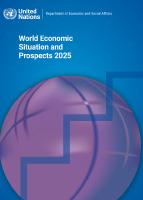
The world economy continues to face significant uncertainties.
- Trade tensions, weak investment, high debt levels and geopolitical conflicts weigh heavily on the outlook, with global growth expected to remain below pre-pandemic levels.
- Low growth continues to severely impact progress towards the Sustainable Development Goals (SDGs), especially for many developing countries still suffering from the cumulative effects of successive crises.
- Many low-income countries continue to grapple with high debt-servicing burdens and limited access to international financing.
Persistent food inflation, combined with low economic growth, risks pushing millions further into poverty.
- Despite easing global inflation, nearly half of developing countries faced food inflation above 5% in 2024.
- This is exacerbating food insecurity in nations already grappling with extreme weather events, conflicts and economic instability.
This year's report spotlights the promise and perils of minerals critical to the energy transition.
- Rising demand for critical minerals such as lithium, cobalt and rare earth elements offers resource-rich developing countries an opportunity to boost growth and advance the SDGs.
- However, these opportunities carry significant risks. Poor governance, unsafe labor practices, environmental degradation and dependence on volatile commodity markets could deepen inequalities and damage ecosystems, undermining long-term development gains.
The UN calls for bold multilateral action to address the interconnected crises of debt, inequality and climate change.
- Monetary easing alone will not suffice to reinvigorate global growth or close widening disparities.
- Governments should avoid overly restrictive fiscal policies and instead focus on mobilizing investments in clean energy, infrastructure and critical social sectors such as health and education.
- Stronger international cooperation is also essential to manage the environmental, social and economic risks associated with critical minerals.
The report was produced by the United Nations Department of Economic and Social Affairs (UN DESA), in partnership with UN Trade and Development (UNCTAD) and the five UN regional commissions: Economic Commission for Africa (UNECA), Economic Commission for Europe (UNECE), Economic Commission for Latin America and the Caribbean (UNECLAC), Economic and Social Commission for Asia and the Pacific (UNESCAP) and Economic and Social Commission for Western Asia (UNESCWA). The UN World Tourism Organization (UN Tourism) also contributed to the report.


